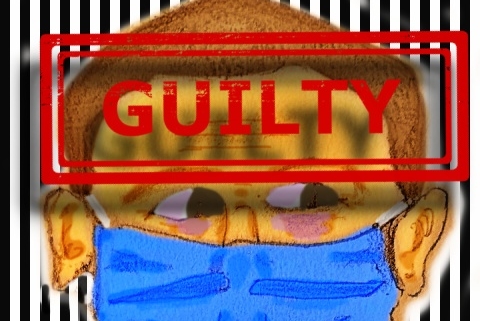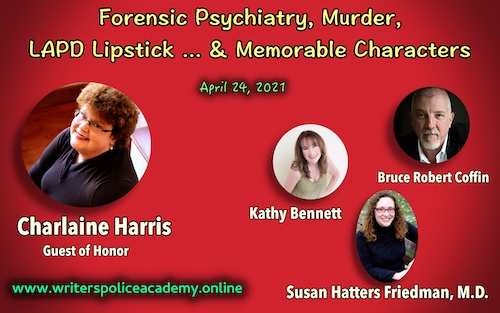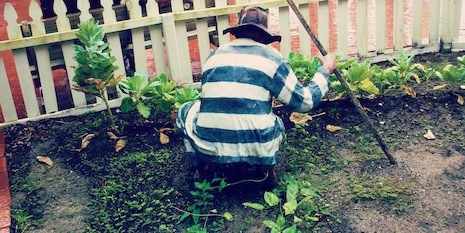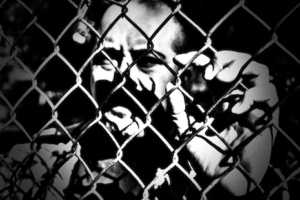The criminal trial is over but the story of George Floyd and Derek Chauvin will continue for many years to come.
Chauvin was found guilty of all charges relating to Floyd’s death, including 2nd degree murder, and after being led from the courtroom in handcuffs he’s now tucked away inside a cell at Minnesota Correctional Facility—Oak Park Heights, Minnesota’s only Level Five maximum security prison. The former police officer is no stranger to the Oak Park Heights prison since it’s the facility is where he was housed until he posted bail and was allowed to remain free until trial.
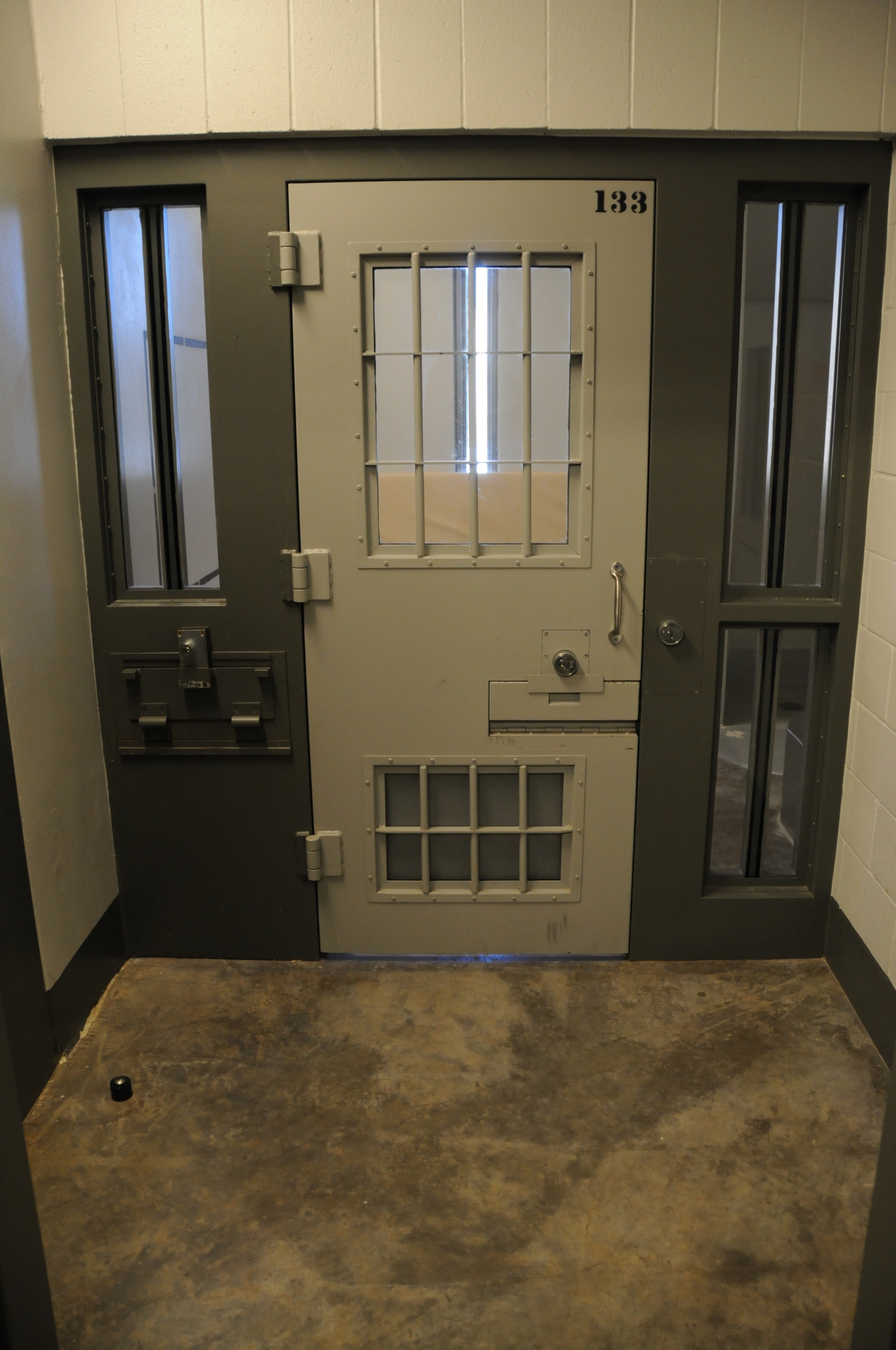
Cell door (Minnesota DOC image)
Now awaiting sentencing , which is scheduled in eight weeks, Chauvin’s home away from home is a 7’x10′ cell inside the institution’s administrative segregation unit. He is under a “suicide watch,” which is not at all unusual in these types of high-profile cases.
For his safety, staff will also closely monitor Chauvin’s every move since he is a former law enforcement officer who likely played a part in the arrests and convictions of inmates within the prison. That, and the prison population are not likely to accept him due to the nature of his crime.
The facility is secure and as safe as they come (keep in mind, it is a prison). No inmates have ever successfully escaped and only one prisoner has been murdered there.
Since Chauvin resides in a restricted housing unit, officers are required to check on him, and other prisoners, at least every half hour. He’ll not have physical contact with staff, unless he acts out in some way, becomes ill or injured, or needs to meet with attorneys or has a visitor. He is allowed one hour of recreation per day, which is a real treat for someone who’s isolated from the world, fresh air, sunshine, raindrops, gentle breezes, grass underfoot, the sounds and smells of spring, the wailing yelps of police sirens in the distance and, well, you get the idea.
Staff conducts more frequent checks of prisoners who are violent, those with serious mental health concerns, and inmates who exhibit odd or unusual behavior. The warden or a senior staff member is required to visit the unit at least once each week.
Cells in the restricted housing unit contain a concrete bed/seat combination that’s equipped with a thin mattress (it’s no Tempur-pedic, believe me) that’s pictured below in use as a seat back. Also pictured below is a steel toilet/sink combo, a standard fixture in jails and prisons.
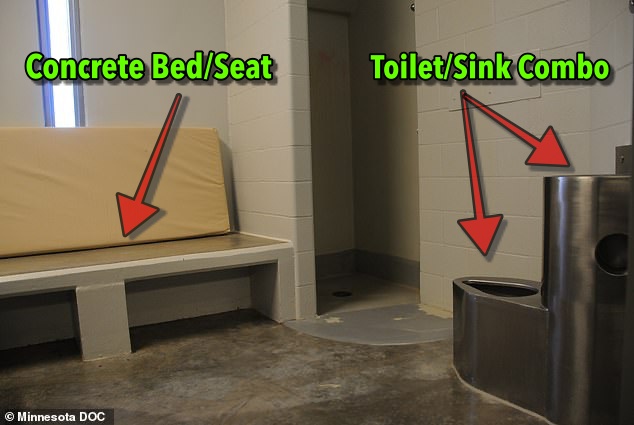
The only view outdoors from these cells is through an extremely narrow window that’s far too small for a human to pass through.
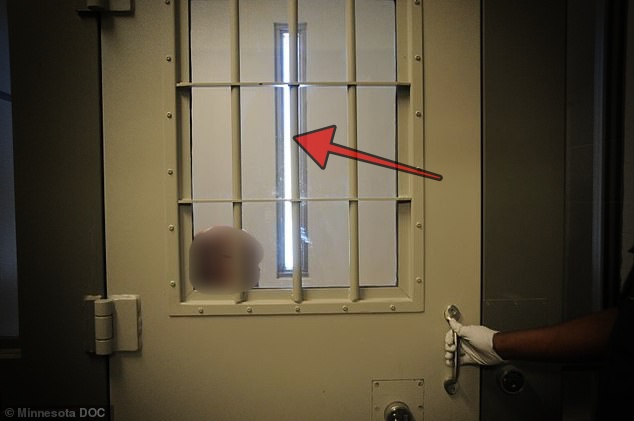
Narrow window (Minnesota DOC image)
Every thirty days, a mental health professional interviews and prepares a written report on each prisoner who is assigned to the restricted housing unit. Mental health staff also respond to the needs of inmates when requested by corrections staff or the prisoner.
Visiting rules at Minnesota Correctional Facility—Oak Park Heights include:
- Visits must be scheduled no less than 24 hours in advance and no more than 10 days in advance.
- Visits for Complex 5 and ACU will be scheduled through visiting NOT the unit.
- COVID Safe Visiting will be limited to a total of 3 visitors.
- All visits will be 1 hour in length.
- All visits will need to be prescheduled by calling the number above or the Online Scheduling Option link above.
- Visitors and inmates will not be allowed to have physical contact at any time.
- Social distancing will be followed at all time.
- Visitors will need to wear a mask at all times.
- No photos will be taken
Visiting Schedule
Sunday – Wednesday
No visiting
Thursday and Friday
10:35 a.m. – 7:45 p.m.
Saturday
7:30 a.m. – 4:30 p.m. Visiting Hours of Operation
Holidays
There is no visiting on the following State recognized holidays:
- New Year’s Day
- President’s Day
- Martin Luther King, Jr. Day
- Memorial Day
- July 4 (Independence Day)
- Labor Day
- Veterans Day
- Thanksgiving and the following Friday
- Christmas Day
Items Allowed
Per prison rules, Chauvin, like all inmates in the restricted housing unit, are allowed to possess only the following items, and nothing more – “clothing, footwear, towels, bedding, writing paper and pen, inmate communication forms, toothpaste, toothbrush, deodorant, soap, shampoo, restricted housing information packet, and a comb.
These additional items are also allowed unless prohibited for safety or security reasons: personal mail, legal materials, wedding rings, approved religious items, shower thongs, address book, eyeglasses, dentures, prosthesis, approved canteen items, ear plugs, and envelopes.
Certain magazines, newspapers, publications, books, and education materials may also be approved as well as radios (in some cases).”
*Next: Eight Longs Weeks Until Sentencing: Why So Long After the Trial?
Only one day left to sign up to reserve your spot!!
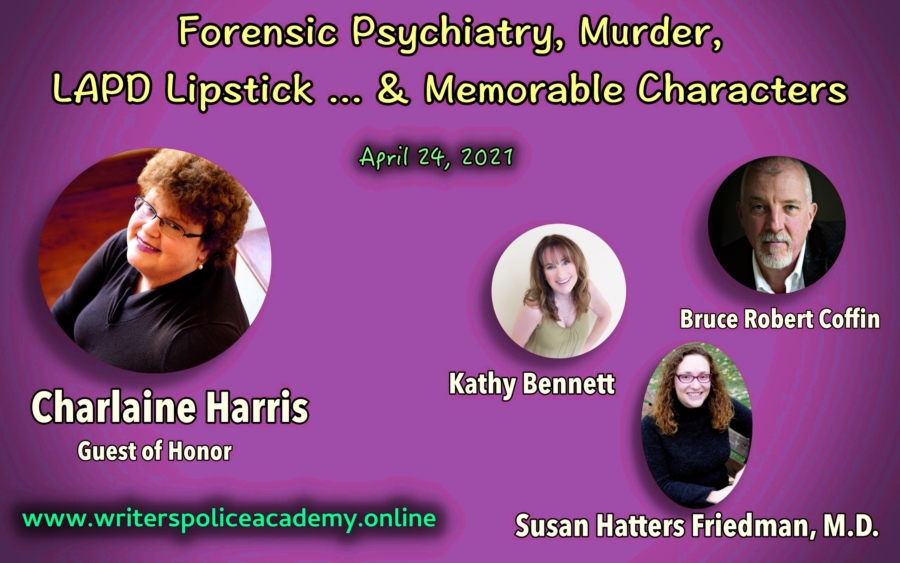
Forensic Psychiatry, Murder, LAPD Lipstick, and Memorable Characters
Presenters
Susan Hatters Friedman, MD
Kathy Bennett
Robert Bruce Coffin
Schedule
Schedule (Times are EST)
10:30 – Login and Test
10:45 – Welcome
11:00 – 12:20
Forensic Psychiatry and Crime Fiction: Correcting the Top 10 Myths
Instructor, Susan Hatters Friedman, M.D.
In this illuminating session, acclaimed forensic and perinatal psychiatrist, Susan Hatters Friedman, M.D., describes common misunderstandings about her field of forensic psychiatry when it appears in crime fiction. These include:
-confusion between forensic psychiatry and psychology
-misunderstandings about forensic hospitals
-how confidentiality works in forensic evaluations
-psychiatrists testifying about their patients
-whether people look left when they are lying
-how malingering is determined
-how forensic psychiatrists get paid
-what insanity means legally
-what incompetency means legally
12:20 – 12:50
Break
12:50 – 2:10
Murder for Real—Adding Realism to Your Mystery Writing
Instructor, Bruce Robert Coffin
Former detective sergeant and award-winning author Bruce Robert Coffin shares his years of experience as supervisor of homicide and violent crimes investigations. This workshop is filled to the brim with behind-the-scenes law enforcement information. This class, taught by one of the best in the business, is certain to help writers create stories that rise to the highest levels.
- The CSI effect. What is it and why it doesn’t fly in high-end writing?
- Evidence gathering (the real deal).
- Cold Cases. What are they and how are they investigated?
- First response vs. CID (two worlds-two goals)
- Dealing with the media.
- Hierarchy and chain of command.
- Job stressors and how cops cope (or don’t).
- Telling lies (everybody does it).
2:20 – 3:40
A Badge, a Gun, and Lipstick: A Female Perspective of Working Patrol on the Mean Streets of Los Angeles
Instructor, former LAPD Senior Lead Officer Kathy Bennett
Have you ever wondered what it’s like to be in a high-speed chase and then be involved in a shoot-out at the pursuit termination? Do you think the cop who gave you a traffic citation was wrong? Do you know what it’s like to tell a mother her only child was killed in a traffic collision? Well, Kathy Bennett experienced all these things and more. In her presentation she’ll reveal candid information of the life of a street cop. Kathy is also happy to answer those burning questions you have but were afraid to ask.
3:50 – 5:10
How to use Research” and “Making Characters Memorable”
Instructor, Charlaine Harris
Author extraordinaire Charlaine Harris, whose Sookie Stackhouse novels were the basis of the television series “True Blood,” reveals the secrets to using research to craft unique characters. This is a rare opportunity for writers at all stages of their careers.
5:10
Final words
Presenter Bios
 Guest of Honor Charlaine Harris is a true daughter of the South. She was born in Mississippi and has lived in Tennessee, South Carolina, Arkansas, and Texas. After years of dabbling with poetry, plays, and essays, her career as a novelist began when her husband invited her to write full time. Her first book, Sweet and Deadly, appeared in 1981. When Charlaine’s career as a mystery writer began to falter, she decided to write a cross-genre book that would appeal to fans of mystery, science fiction, romance, and suspense. She could not have anticipated the huge surge of reader interest in the adventures of a barmaid in Louisiana, or the fact that Alan Ball would come knocking at her door. Since then, Charlaine’s novels have been adapted for several other television series, with two in development now. Charlaine is a voracious reader. She has one husband, three children, two grandchilden, and two rescue dogs. She leads a busy life. www.charlaineharris.com is her website.
Guest of Honor Charlaine Harris is a true daughter of the South. She was born in Mississippi and has lived in Tennessee, South Carolina, Arkansas, and Texas. After years of dabbling with poetry, plays, and essays, her career as a novelist began when her husband invited her to write full time. Her first book, Sweet and Deadly, appeared in 1981. When Charlaine’s career as a mystery writer began to falter, she decided to write a cross-genre book that would appeal to fans of mystery, science fiction, romance, and suspense. She could not have anticipated the huge surge of reader interest in the adventures of a barmaid in Louisiana, or the fact that Alan Ball would come knocking at her door. Since then, Charlaine’s novels have been adapted for several other television series, with two in development now. Charlaine is a voracious reader. She has one husband, three children, two grandchilden, and two rescue dogs. She leads a busy life. www.charlaineharris.com is her website. Susan Hatters Friedman, MD is a forensic and perinatal psychiatrist. She has practiced in forensic hospitals, general hospitals, court clinics, community mental health centers, and correctional facilities. Dr. Friedman has served as vice-President of the American Academy of Psychiatry and the Law (AAPL), and as Chair of the Law and Psychiatry committee at the Group for Advancement of Psychiatry (GAP). She has received the AAPL award for the Best Teacher in a Forensic Psychiatry Fellowship, the Red AAPL award for outstanding service to organized forensic psychiatry, the Manfred Guttmacher Award for editing the book Family Murder: Pathologies of Love and Hate, and the Association of Women Psychiatrists’ Marian Butterfield early career psychiatrist award for her contributions to women’s mental health. She has published more than 100 articles (including in World Psychiatry and the American Journal of Psychiatry) as well as book chapters. Her research has primarily focused on the interface of maternal mental health and forensic psychiatry, including notably child murder by mothers.
Susan Hatters Friedman, MD is a forensic and perinatal psychiatrist. She has practiced in forensic hospitals, general hospitals, court clinics, community mental health centers, and correctional facilities. Dr. Friedman has served as vice-President of the American Academy of Psychiatry and the Law (AAPL), and as Chair of the Law and Psychiatry committee at the Group for Advancement of Psychiatry (GAP). She has received the AAPL award for the Best Teacher in a Forensic Psychiatry Fellowship, the Red AAPL award for outstanding service to organized forensic psychiatry, the Manfred Guttmacher Award for editing the book Family Murder: Pathologies of Love and Hate, and the Association of Women Psychiatrists’ Marian Butterfield early career psychiatrist award for her contributions to women’s mental health. She has published more than 100 articles (including in World Psychiatry and the American Journal of Psychiatry) as well as book chapters. Her research has primarily focused on the interface of maternal mental health and forensic psychiatry, including notably child murder by mothers.
She currently serves as the inaugural Phillip J. Resnick Professor of Forensic Psychiatry at Case Western Reserve University, where she also has appointments in the departments of Pediatrics, Reproductive Biology (Obstetrics/ Gynecology), and Law. Dr. Friedman also serves as honorary faculty at the University of Auckland (New Zealand).
 Kathy Bennett worked for the LAPD for twenty-nine years. Eight years were spent as a civilian employee, and she served twenty-one years as a police officer. While most of her career was spent in a patrol car, Kathy also worked at the police academy as a firearms instructor, promoted to the position of a field training officer, then worked in the “War Room” as a crime analyst. She promoted again, this time to the position of Senior Lead Officer—where she was in charge of a basic car area within a geographic division. She’s done a few stints undercover and was honored to be named Officer of the Year in 1997.
Kathy Bennett worked for the LAPD for twenty-nine years. Eight years were spent as a civilian employee, and she served twenty-one years as a police officer. While most of her career was spent in a patrol car, Kathy also worked at the police academy as a firearms instructor, promoted to the position of a field training officer, then worked in the “War Room” as a crime analyst. She promoted again, this time to the position of Senior Lead Officer—where she was in charge of a basic car area within a geographic division. She’s done a few stints undercover and was honored to be named Officer of the Year in 1997.
In her spare time, Kathy started writing romance books. However, she decided she wasn’t really cut out to be a romance author—she’d never write the romance but was always killing off one or more characters in the book. After a few years she realized she’d better write what she knew: Authentic Crime told in Arresting Stories. So, this retired cop started killing off fictional people…and she likes it!
Kathy lives in Idaho with her husband and soul mate, Rick (also a retired LAPD officer.) They have two entertaining and energetic Labrador retrievers, and one cat who isn’t nearly as energetic or entertaining…but she’s loved just as much. Kathy likes to garden, exercise, and spend time with their daughter and her family. Kathy says, “Life doesn’t get much better than the one I’m living. Welcome to my world, and I hope you’ll feel comfortable enough to contact me and say “Hi”.
Kathy can always be reached at Kathy@KathyBennett.com.
Her website is www.kathybennett.com
 Bruce Robert Coffin is the award-winning author of the bestselling Detective Byron mystery series. A former detective sergeant with more than twenty-seven years in law enforcement, he supervised all homicide and violent crime investigations for Maine’s largest city. Following the terror attacks of September 11, 2001, Bruce spent four years investigating counter-terrorism cases for the FBI, earning the Director’s Award, the highest award a non-agent can receive.
Bruce Robert Coffin is the award-winning author of the bestselling Detective Byron mystery series. A former detective sergeant with more than twenty-seven years in law enforcement, he supervised all homicide and violent crime investigations for Maine’s largest city. Following the terror attacks of September 11, 2001, Bruce spent four years investigating counter-terrorism cases for the FBI, earning the Director’s Award, the highest award a non-agent can receive.
His novel, Beyond the Truth, winner of Killer Nashville’s Silver Falchion Award for Best Procedural, was a finalist for the Agatha Award for Best Contemporary Novel and a finalist for the Maine Literary Award for Best Crime Fiction. His short fiction appears in several anthologies, including Best American Mystery Stories 2016.
Bruce is a member of International Thriller Writers, Mystery Writers of America, Sisters in Crime, and the Maine Writers and Publishers Alliance. He is a regular contributor to Murder Books blogs.
Bruce is represented by Paula Munier at Talcott Notch Literary.
He lives and writes in Maine.

